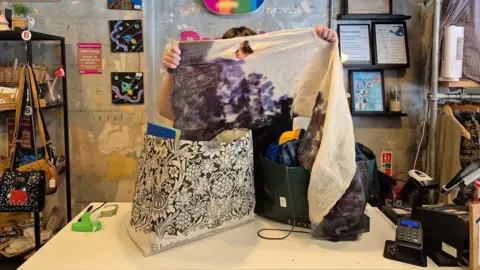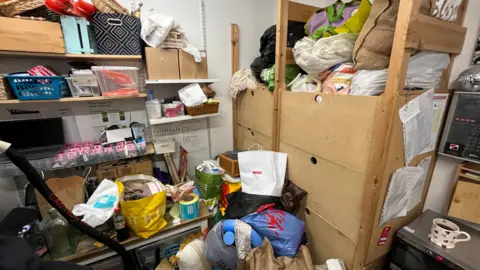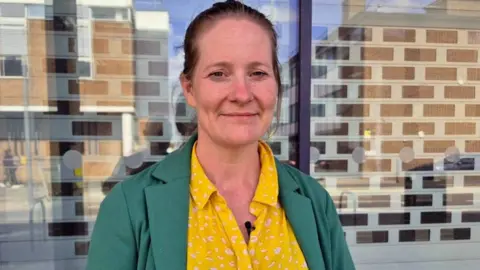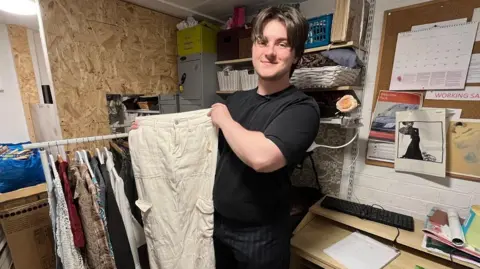Dirty nappies and stained clothes left at charity shops
 BBC
BBCDamp clothes, tops with armpit stains and dirty nappies are just some of the problematic donations faced by charity shops.
The BBC has spoken to 50 charity shops across Bristol, Gloucester, Taunton, Bath and Swindon, with staff in almost all saying they felt their shops were being used as a bin.
Many shop managers and staff spoke anonymously so they could be frank about their experiences, which in any week could involve rifling through 100 bags of donated clothes, much of it unusable.
The Charity Retail Association insisted current industry conditions were a "blip", with almost two thirds of its members considering opening new shops.

Staff and volunteers at the Brandon Trust in Bristol sort through around 100 bags per week, with many of the donations unable to go on their shop floor.
Assistant manager Jack Osborne acknowledged the challenges shops are facing.
He insisted the majority of donations were of a high standard, though conceded that "many people do use charity shops as an alternative to a landfill site".
"If we continue to get donations which are degraded in quality, it means goodwill and trust with customers and people who use the charity might actually be eroded," he said.
"So we're always going to try and tell people to focus on the quality of donations [they're] giving to us, rather than just seeing us as the middle man for their waste."

The charity shops the BBC spoke to were not scientifically selected. Of the 50, 44 said the public was using them as a "bin". 26 said they believed the quality of donations had gone down, causing them to generate more waste and 19 said they feared for the viability of their shops.
A handful described finding general waste, including dirty nappies, hidden in bags underneath clothing.
Staff said they often had to dispose of clothing with holes or armpit stains as they couldn't sell it.
Other common issues are fly-tipping at shop front doors and bags being dropped off outside overnight, regardless of the weather.
If the clothes are damp they can't be sold, so they end up as waste too.
Shop managers asked those dropping off items to consider whether a charity could actually sell them, with further guidance offered on the Charity Retail Association's website.
Decline in 'rag trade'
Clothes that shops can't sell to the public are instead sold to textile recyclers, meaning charities can still make money from them.
However, some shops the BBC spoke to said it was becoming more difficult to sell to recyclers, because used textiles are declining in value – making it less lucrative for the recyclers to come and collect them.
Since the pandemic, the price for what is known as "rag" has collapsed, falling from 42p per kilogram in February 2020 to around 12p per kilogram now, according to letsrecycle.com.
In a statement, the Textile Recycling Association (TRA) told the BBC the industry was "grappling with several key challenges".
These include the impact of fast fashion, which means many clothes are "made from low-quality, short-life materials… that are difficult to reuse or recycle".
A 2024 report from Textiles Exchange showed that the amount of synthetic fibres, such as polyester and nylon, used in clothing rose from 67 million tonnes in 2022 to 75 million in 2023.
Polyester accounted for 57% of fibres produced that year, while nylon made up 5% in the same period.
The conflict in Ukraine has also closed off a textile export market, removing a previously stable revenue stream.
The TRA says the sheer volume of used textiles on the market and major recycling firms going out of business are also having a big effect on price.
For some charity shops, the decline in rag collections, coupled with poor quality clothing, means they must pay to dispose of unsellable clothing, just to make room for new donations.

Fear Free, a charity that supports victims of domestic violence, set up its first charity shop in Trowbridge, Wiltshire, in October 2024, but had to shut in March.
CEO Debbie Beadle said the shop was opened as an experiment to try to generate extra income, but it soon became apparent it was going to make a loss.
"The cost of running the building was quite high – electricity bills and utility bills in general, the cost of staff and obviously the increase with the National Insurance," she said.
"And then just the donations that we had, we had lots of really great donations and really committed people.
"[But] we also had quite a lot of donations which we then had to dispose of and that cost us a lot. Because we just had the one charity shop, it was just challenging to make ends meet."
Ms Beadle hopes the charity might open another shop when the time is right.
'Weather the storm'
The Charity Retail Association acknowledged many of its members were facing challenging times.
CEO Robin Osterley, said that while he wasn't surprised many of the shops we visited were fearful for their future, it was just a "blip" that its members could endure.
"I do think it's a question of weathering the storm," he said.
"In our most recent survey, 65% of our members said they were either thinking about or actively were opening new shops and only 35% said they were thinking about closing shops.
"Although there is that fear factor out there, we're not facing an existential crisis for charity retail."
Mr Osterley insisted his members' "resilience is absolutely extraordinary and has been going ... since the Second World War really".
He said "creativity" was helping many shops survive.

The Brandon Trust is employing volunteers with craft skills to give new life to clothing that would otherwise have been too damaged to sell.
The shop's Mr Osborne said that sustainability was one of the main motivations.
"As people donate more stock, we need to try and find a way that can maximise those items," he said.
"Bristol's a very vibrant place, full of creatives and people who are just waiting to be given the chance to use their craft in fun and quite inspiring ways."
Follow BBC Bristol on Facebook, X and Instagram. Send your story ideas to us on email or via WhatsApp on 0800 313 4630.
